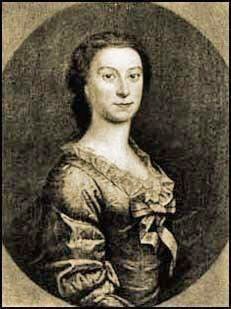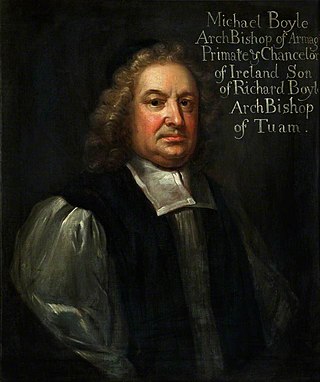
Esther Vanhomrigh or Van Homrigh, an Irish woman of Dutch descent, was a longtime lover and correspondent of Jonathan Swift. Swift's letters to her were published after her death. Her fictional name "Vanessa" was created by Swift by taking Van from her surname, Vanhomrigh, and adding Esse, the pet form of her first name, Esther.

Margaret Ball (1515–1584) was a prominent member of 16th-century Irish society, who, despite being the widow of a Lord Mayor of Dublin, was arrested for her adherence to the Catholic faith and died of deprivation in the dungeons of Dublin Castle. She was declared a martyr for the faith by the Catholic Church and beatified in 1992, one of a group of 17 Irish Catholic Martyrs.
Francis Taylor was a Mayor of Dublin, Ireland, who was incarcerated because of his Catholicism. He has been declared a martyr for his faith and beatified by the Catholic Church.

Ballygall is a small suburban area located between Glasnevin and Finglas, on the northside of the city of Dublin, Ireland. It is also a townland divided between the civil parish of Finglas and that of Glasnevin. It was settled by Vikings in the 11th century, and later by the Cambro-Normans.
James Barry, 1st Baron Barry of Santry PC (Ire) (1603–1673) was an Irish lawyer, judge and peer.

Michael Boyle, the younger was a Church of Ireland bishop who served as Archbishop of Dublin from 1663 to 1679 and Archbishop of Armagh from 1679 to his death. He also served as Lord Chancellor of Ireland, the last time a bishop was appointed to that office.

William Whitshed (1679–1727) was an Irish politician and judge who held office as Solicitor-General and Lord Chief Justice of Ireland; just before his death he became Chief Justice of the Irish Common Pleas. He became the Member of Parliament for County Wicklow in 1703, and was appointed as Solicitor-General in 1709; he was Lord Chief Justice 1714–1727.

John Bysse (c.1602–1680) was a member of the Parliament of Ireland during the 1630s and 1640s. He was excluded from office during the Interregnum, but became one of the most senior Irish judges after the Restoration of Charles II.
Sir William Welles was an English-born statesman and judge in fifteenth-century Ireland, who held the office of Lord Chancellor of Ireland. He was the younger brother of Lionel de Welles, 6th Baron Welles. Lionel was a prominent supporter of the House of Lancaster, who was killed at the Battle of Towton on 29 March 1461.

John Bathe was an Irish barrister and judge. He was a member of a famous legal dynasty, and had a distinguished career under the Tudors, holding office as Solicitor General for Ireland and Chief Justice of the Irish Common Pleas.
Sir Thomas Luttrell was a wealthy Anglo-Irish landowner of the sixteenth-century Irish Pale. He was also a distinguished lawyer and judge who held the offices of King's Serjeant, Solicitor General for Ireland and Chief Justice of the Irish Common Pleas.
Jenet Sarsfield, Baroness Dunsany was an Anglo-Irish noblewoman who lived in Dublin during the Tudor era. She is chiefly memorable for having married no less than six husbands.
Sir James Dowdall was an Irish judge of the Elizabethan era who briefly held office as Lord Chief Justice of Ireland. He should not be confused with James Dowdall, the Catholic martyr, who was his cousin.
Clement Fitzleones, FitzLyons, or Leones was an Irish lawyer and judge. He held the offices of Serjeant-at-law (Ireland) and Attorney-General for Ireland and was briefly Deputy to the Chief Baron of the Irish Exchequer.
Adam Cusack (c.1630–1681) was an Irish landowner, barrister and judge of the seventeenth century.
Bartholomew Ball was Mayor of Dublin in 1553–54.
Walter Ball was from a wealthy Irish merchant family. His father Bartholomew Ball, his brother Nicholas Ball and sons Robert Ball and Edward Ball all served as Mayor of Dublin. He married Eleanor Ussher, daughter of Alderman Robert Ussher of Santry and his first wife Margaret St. John. He conformed to the established religion (Anglican) to progress politically, and became Commissioner for Ecclesiastical Causes, imposing the Reformation on Dublin. This led to the conflict with his mother, Margaret Ball, whom he imprisoned for recusancy in Dublin Castle, where she endured conditions of appalling squalor for four years. Despite protests from other family members, especially his brother Nicholas, Walter defended his actions, arguing that he had shown clemency by sparing his mother's life, and that she could free herself by swearing the Oath of Supremacy. He remained implacable and during his brother's term as Mayor managed to thwart his efforts to free their mother. Margaret died in prison, and now is venerated as the Blessed Margaret Ball by the Catholic church for being Martyred for her faith.
John Cusacke was a wealthy merchant, landowner and local politician in seventeenth-century Dublin, who served as both Mayor and Sheriff of Dublin city.

Nicholas Kerdiffe was an Irish barrister and Law Officer of the early seventeenth century.
Sir John Elliott (1546-1617) was an Irish judge of the late sixteenth and early seventeenth centuries, who held office as third Baron of the Court of Exchequer (Ireland). He was also occasionally employed on diplomatic missions. Though his highly successful career was due partly to his own merits, it probably also owed something to his useful family connections, notably with the Rochfort family and the Usshers.







